Horticulturist
Entry Level Qualification
10
Career Fields
Agriculture & Food Science
For Specially Abled






About Career
1. Horticulture is the scientific methodology to cultivate process and produce crops that yield the desired quality; like flowers, plants, and vegetables that are used for food and non-food purposes such as ornamental and decorative purposes. Horticulturists conduct research in gardening and landscaping, plant propagation, crop production, plant breeding, genetic engineering, plant biochemistry, and plant physiology. Their work mainly involves fruits, vegetables, flowers, trees, shrubs, turf, and soil management.
2. As a Horticulturist, you will apply your skills and technologies to cultivate and grow with the intention of quality, nutritional value, and resistance to insects, and diseases, and reduce environmental damage by taking on approaches such as water waste reduction and chemical-free methods of pest management.
3. Some Horticulturists also have a more commercial approach like designing commercial landscapes or managing sports turf and golf courses.
Key roles and responsibilities
As a Horticulturist, you may work in multiple workspaces such as greenhouses, nurseries, and plant production organizations. You can choose to work in any department such as research, management, consultation, teaching, and farming, and can be qualified to do a variety of jobs. Following are some of your key roles and responsibilities:
1. Engaging in plant research within a particular discipline such as floriculture, viticulture, or pomology. Some horticulturists study plant evolution and development under natural conditions while some may conduct research in very controlled settings.
2. Planting seeds, bulbs, flowers, shrubs, and trees, and doing maintenance work such as weeding, fertilizing, pruning, and cutting.
3. Planning and designing of complex arboreal systems and gardens.
4. Preparing land for plant cultivation and knowing how to treat plants to avoid and control insect infestation and disease.
5. Working in landscape horticulture and advising clients on proper plant products and irrigation to maintain the look and integrity of the greenery.
6. Providing consultation to various farmers, landscapers, and other customers and advising them on planting, growing, and harvesting techniques.
7. Researching and writing for publications or giving public speeches regarding environmental sustainability and protection.
PARTICULARS | DESCRIPTION |
Name | Horticulturist |
Purpose | Oversee And Improve The Growth of Plant |
Career Field | Agriculture & Food Science |
Required Entrance Exam | BHU UET, WBJEE, KEAM, TSEAM CET, AP EAPCET, ICAR UG |
Average Salary | 300000 - 900000 Rs. Per Year |
Companies For You | Agri-Starts, DP-Deroose Plants & Many More |
Who is Eligible | Class 10th Pass |
Career Entry Pathway
Class 10 all subjects as per the scheme of studies – Class 11-12 Physics, Chemistry, and Biology along with any other subject as per the scheme of studies – B.Sc. in Agriculture/ Horticulture.
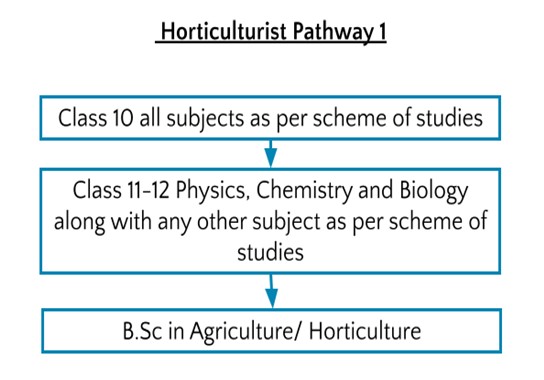
After Class 11-12 Physics, Chemistry, and Biology along with any other subject as per the scheme of studies, you can complete your higher secondary in science Stream with Physics, Chemistry, and Biology. After your schooling, you can take an undergraduate course in Agriculture/ Horticulture.
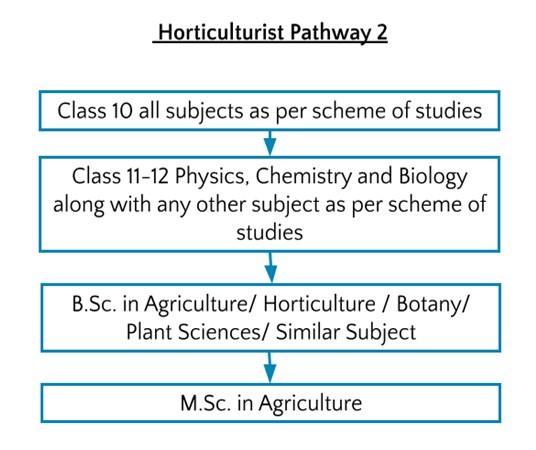
After After Class 11-12 Physics, Chemistry, and Biology along with any other subject as per the scheme of studies, you can complete your higher secondary in science Stream with Physics, Chemistry, and Biology. After your schooling, you can take an undergraduate course in Agriculture/ Horticulture/ Botany / Plant Science / similar subject. Once you complete your graduation, you can take a Post Graduate Master’s course in Horticulture.
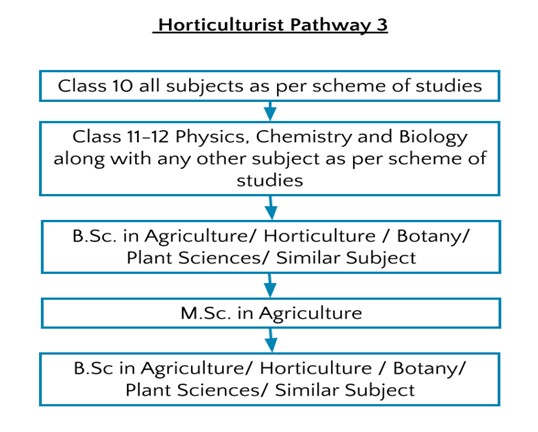
After After Class 11-12 Physics, Chemistry, and Biology along with any other subject as per the scheme of studies, you can complete your higher secondary in science Stream with Physics, Chemistry, and Biology. After your schooling, you can take an undergraduate course in Agriculture/ Horticulture/ Botany / Plant Science / similar subject. Once you complete your graduation, you can take a Post Graduate Master’s course in Horticulture. After this, you can take a Ph.D. course in Horticulture.
Required Qualification & Competencies
You should either do a Bachelor's degree in Agriculture or Horticulture. Then you may opt to do a Master’s degree in Horticulture / Floriculture / Fruit Science / Horticultural Entomology / Horticultural Plant Pathology / Vegetable Science / or in a similar subject. You may also opt for a Ph.D. after your Master’s degree.
MINIMUM EDUCATION REQUIRED | MAXIMUM EDUCATION REQUIRED |
Under Graduate Undergraduate Degree / Honours Diploma / Graduate Diploma (equivalent to a Degree) Programs for which the minimum eligibility is a pass in Higher Secondary / Class XII School Leaving examination. | Doctoral All Ph.D. or equivalent degree programs for which the minimum eligibility is a Postgraduate or a Pre-Doctoral degree. |

Competencies Required
Interests
1. Investigative: You should have an interest in Investigative Occupations. Investigative occupations involve working with ideas and quite a lot of thinking, often abstract or conceptual thinking. These involve learning about facts and figures; involve the use of data analysis, assessment of situations, decision-making, and problem-solving.
2. Realistic: You should have an interest in Realistic Occupations. Realistic occupations involve more practical and hands-on activities than paperwork or office work. Realistic occupations often involve physical activities for getting things done using various tools and equipment.
Abilities
1. Abstract Reasoning: The ability to understand ideas that are not expressed in words or numbers; the ability to understand concepts that are not clearly expressed verbally or otherwise.
2. Deductive Reasoning: The ability to apply general rules and common logic to specific problems to produce answers that are logical and make sense. For example, understanding the reasons behind an event or a situation using general rules and common logic.
3. Inductive Reasoning: The ability to combine pieces of information from various sources, concepts, and theories to form general rules or conclusions. For example, analyzing various events or situations to come out with a set of rules or conclusions.
4. Naturalistic Intelligence: The ability to recognize different flora and fauna of the world; sensitivity towards nature and natural surroundings; sensitivity towards the needs of different flora and fauna.
5. Verbal Reasoning: The ability to think and reason with words; the ability to reason out ideas expressed in words.
6. Written Comprehension: The ability to read and understand information and ideas presented in writing.
Knowledge
1. Biological Sciences: Knowledge of plants and animals, their anatomical structure, cell structure, tissues, physiological functions, evolution, and all other related aspects.
Skills
1. Active Learning: Focused and continuous learning from various sources of information, observation, and otherwise for application in getting work done.
2. Critical Thinking: Skills in analysis of complex situations, using of logic and reasoning to understand the situations and take appropriate actions or make interpretations and inferences.
3. Judgment and Decision Making: Skills in considering the pros and cons of various decision alternatives; considering costs and benefits; and making appropriate and suitable decisions.
4. Problem Solving: Skills in analysis and understanding of problems, evaluating various options to solve the problems, and using the best option to solve the problems.
5. Reading Comprehension: Skills in understanding written sentences and paragraphs in work-related documents.
6. Scientific: Skills in using various scientific rules and methods to get things done or solve problems.
Personality
1. You are somewhat organized in your day-to-day life and activities.
2. You are somewhat careful about your actions and behavior.
3. You are imaginative sometimes.
4. You prefer to experience new things and have new experiences sometimes.
5. You act independently sometimes but do not do so at some other times.
6. You are always practical in most situations.
Career - Job Opportunities & Profiles
1. After M.Sc., you can work as a Research Associate or Junior Research Fellow and then as a Senior Research Fellow in agricultural research institutes/universities.
2. After M.Sc., you can work as a Project Assistant in NGOs and agricultural research organizations/NGOs dealing with agricultural resources and related issues.
3. After your Ph.D., you can work as a Scientist/ Assistant Professor at a university.
4. You can work as a Management Trainee in any company that deals with growing or selling of these plant/plant products.
5. You can work as an Assistant Horticulture Inspector who is hired by the State or Central Government after clearing the Civil Services Exam.
6. You can work as a Technical Assistant in almost every field and assist with data and paperwork.
Work environment
Horticulturists mostly work in the outdoors, which involves a lot of physical work and they may even have to work in hot weather conditions. Their outdoor workplaces involve farming, and landscape management of gardens, parks, hotels, resorts, and health farms. When working indoors, their workplaces can include greenhouses, research laboratories, classrooms warehouses, and other indoor office spaces. In general, horticulture involves a lot of hands-on work such as plucking, pruning, planting, and soil management. Horticulturists have regular office hours unless it is harvesting season which is when the workload can increase.
Specialisation Tracks In This Career
1. Garden Designer
Garden Designers specialize in designing and creating plans for the layout and planting of gardens and landscapes. They manage the overall look and feel of the garden. They also know the soil, design, climatic zones, and the kinds of plants that can grow in the garden.
2. Floriculturist
Floriculturist specializes in the cultivation of flowering and ornamental plants. As a floriculturist, you will work to grow and maintain flowers and floral plans. You will work on the plant breeding to ensure the growth and propagation of the plant continues. As a floriculturist, you will grow houseplants, pot plants, flowering gardens, cut cultivated greens, and cut flowers.
3. Turf Specialist
Turf specialists specialize in the management, care, and growth of sporting turfs. As a turf specialist, you will be working in stadiums, and grounds of various sports including Cricket, Football, Tennis (Grass Court), Golf, Athletics Stadium, etc. You will maintain the right amount of grass on the ground, cut the grass from key areas like the pitch in cricket, give regular water and manure, and keep weeds out of the grass. You will also ensure a good drainage system so that rain does not affect the game.
4. Arboriculturist
Arboriculturists specialize in the cultivation and management of shrubs, vines, and other perennial woody plants (the perennial plant is a plant that has lived for more than 2 years). As an Arboriculturist, you will take care of big-size trees and shrubs in gardens, office areas, roadside trees, etc.
5. Landscaping Designer
Landscaping designers and architects specialize in modifying the visible features of an area. As a landscaping designer, you will work on the designing of the area, adding gardens and plants, understanding soil, etc.
6. Olericulturist
Olericulturists specialize in the science of growing vegetables. As a floriculturist, you will work to nurture plants that have some parts that can be used as vegetables. Some of these plants may have eatable leaves like spinach, some of them have eatable roots like carrots and potatoes, and some of them will be legumes like beans and peas, etc. You will work to produce, store, and process vegetables.
7. Pomologist
Pomologists specialize in the science of growing fruits. Apart from growing fruits, you will also be working towards research leading to the development, enhancement, and cultivation of fruits
8. Floriculturist
Floriculture is meant for those who are passionate about flowers. This specialization is also known as flower farming and deals with the study of growing flowering plants. A floriculturist grows flowers for recreational and ornamental purposes that can later be used in the pharmaceutical sector and for perfumery. A floriculturist can work in greenhouses/polyhouses and gardens/open fields and can also work as an interior decorator, wholesale florist, and floral designer.
9. Fruit Scientist (Pomologist)
Pomology is the study of the cultivation of fruits and nuts including oranges, pears, walnuts, and almonds. The responsibilities of a pomologist involve enhancing the fruit quality, regulating production periods, and ensuring the fruits are commercially viable.
10. Horticultural Entomologist
The study of insects and their relationship with other organisms, humans, and the environment is known as Entomology. Concerning horticulture, horticultural entomologists study insects to understand developments in pest control, pharmaceutical epidemiology, food and fiber production and storage, and biological diversity. Gathering all this information will help grow plants more efficiently and prevent them from decaying.
11. Vegetable Scientist (Olericulturist)
Olericulture is the study of growing vegetables and plants for their edible parts. Some examples of vegetable crops are pot herbs and greens, (spinach), salad crops (lettuce and celery), root crops (carrots and potatoes), and bulb crops (onions and leeks). An Olericulturist or a vegetable scientist deals with research and improvement of the growth of these crops, along with storing, processing, and marketing the produce.
12. Oenologist
Oenology is the study of wine and winemaking. It is different from Viticulture since the latter is more about the agricultural aspect of grapes and wine. Oenologists are also known as winemakers and supervise and manage the stages of wine production. They coordinate with viticulturists for growing and harvesting grapes, directing the fermentation process, monitoring the aging process, and overseeing the bottling of wines. Oenologists can also develop new wines and participate in the administrative side of the winemaking business.
Career Growth
1. If you work as a Research Associate, then you can further become a Doctoral Research Fellow, a Post-Doctoral Research Fellow, and then a Scientist.
2. If you start working as a Scientist, you will start working as a research scientist. You can then get promoted to a senior research scientist and then a principal scientist.
3. If you start working as a professor, you will first begin as an Assistant Professor. You can then get promoted to an Associate Professor and then a Professor. Professors can also get administrative positions such as Director/Dean/Vice Chancellor, etc.
4. When you start as a Management Trainee, you can go on to become an Executive Manager and then an Assistant Manager. You can further get promoted to a Senior Manager, a Deputy Manager, and then a Product Manager.
5. When you start working as an assistant horticulture inspector after clearing your exam, you can further work as a horticulture inspector. You can further get promoted to a district horticulture inspector, a farm supervisor, or a marketing inspector.
6. You can also build a career by being self-employed and working as a Horticulture Consultant or Therapist, Floral decorator/ Fruit/ Vegetable / Flower grower, etc. You can also choose to be an entrepreneur by setting up a horticulture farm and growing fruits, vegetables, or flowers or a horticulture nursery for nursery production of horticultural plants.
Salary Offered
1. In Government jobs, horticulturists can earn Rs. 55,000 - 65,000 per month.
2. After 3-8 years of experience, you can earn a salary of Rs. 65,000 - 80,000.
3. After 9-15 years of work experience, you can earn a salary of Rs. 1,20,000 - 1,70,000.
4. With 15-20 or more years of work experience, you can earn a salary of Rs. 1,80,000 - 2,40,000.
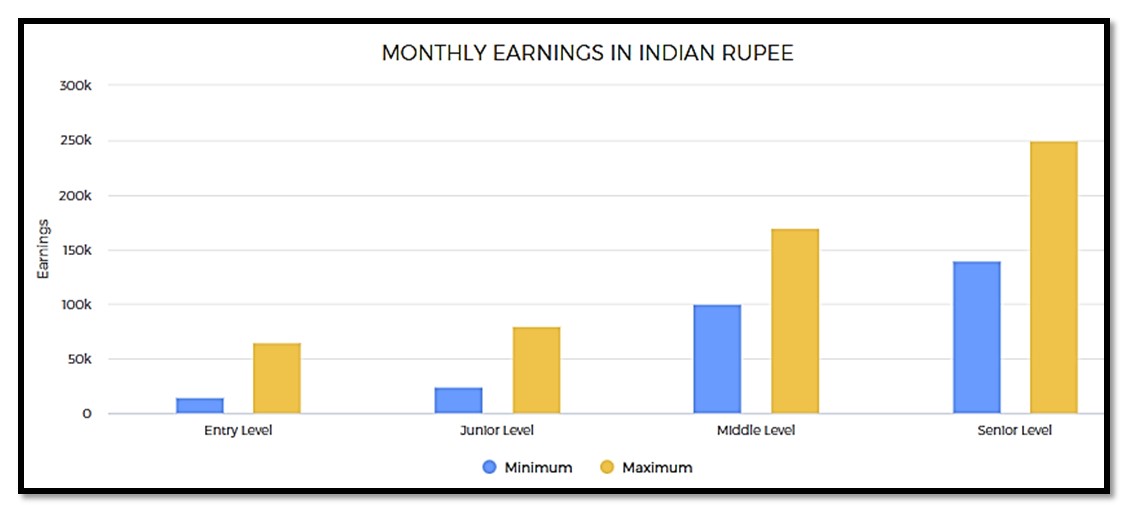
Monthly Earnings In Indian Rupee
Entry Level | Junior Level | Mid Level | Senior Level | ||||
Min Earning | Max Earning | Min Earning | Max Earning | Min Earning | Max Earning | Min Earning | Max Earning |
20000 | 70000 | 25000 | 100000 | 40000 | 150000 | 50000 | 200000 |
1. Entry level: 0 - 2 years of work experience
2. Junior Level: From 1 to 12 years of work experience
3. Mid-Level: From 5 to 20+ years of work experience
4. Senior Level: From 10 to 25+ years of work experience (there could be exceptions in some high-end technical, financial, engineering, creative, management, sports, and other careers; also shortly, people will reach these levels much faster in many careers and some careers, these levels will have no meaning as those careers will be completely tech skill driven such as even now, there is almost no level in a Cyber Security Expert’s job)
Work Activities
1. Analysing and interpreting data and information: Analysis of data and information to find facts, trends, reasons behind situations, etc.; interpretation of data to aid in decision-making.
2. Communicating with co-workers and others: Communicating with people in writing, verbally or otherwise inside your workplace and various other people who have professional relationships with your place of work including vendors, government officials, etc., or with people at large.
3. Decision-making and problem-solving: Analysis of data and information; evaluation of alternative decisions and results of decisions; making the right decisions and solving problems.
4. Getting Information and learning: Observing, hearing, reading, using computers, or otherwise obtaining information and learning from it.
5. Identifying objects, actions, and events: Identifying various characteristics of objects; observing and understanding actions and events; understanding changes in actions and events.
6. Providing advice and consultation to others: Giving advice or consultation to others about various issues, conceptual matters, know-how, scientific matters, products, or services.
7. Training and teaching: Understanding the educational and training needs of others, developing training programs and educational programs, conducting training programs, teaching and instructing others.
8. Updating and using relevant knowledge: Keeping updated with the latest knowledge relevant to your fields of work and using the relevant knowledge in getting things done.
9. Working in a team: Working in a team of people; developing a team; and maintaining professional relationships among team members.
Future Prospects
1. The horticulture sector has become one of the major drivers of the growth in the agricultural industry in India. This sector enables the population at large to enjoy a diverse and balanced diet for healthy living.
2. The percentage share of horticultural crops is 30% of the total agricultural output, and India is the second largest producer of fruits and vegetables in the world, and the leader in several crops such as mangoes, papaya, cashew nuts, potatoes, and okra. Over the last decade, the area under horticulture grew by about 3% per annum and annual production increased by 5.4%. The production of vegetables has increased from 58.5 million tonnes to 175 million tonnes from 1991-92 to 2016-17.
3. In addition to the beautification of the local landscape, the production share of various Horticulture crops includes an enormous scope for the export of flowers; and floriculture is important for the beekeeping industry which also provides an alternate source of income to professionals. The highest production of Flowers was recorded in Tamil Nadu (416.63 Thousand Tonnes) followed by Karnataka (280.92 Thousand Tonnes).
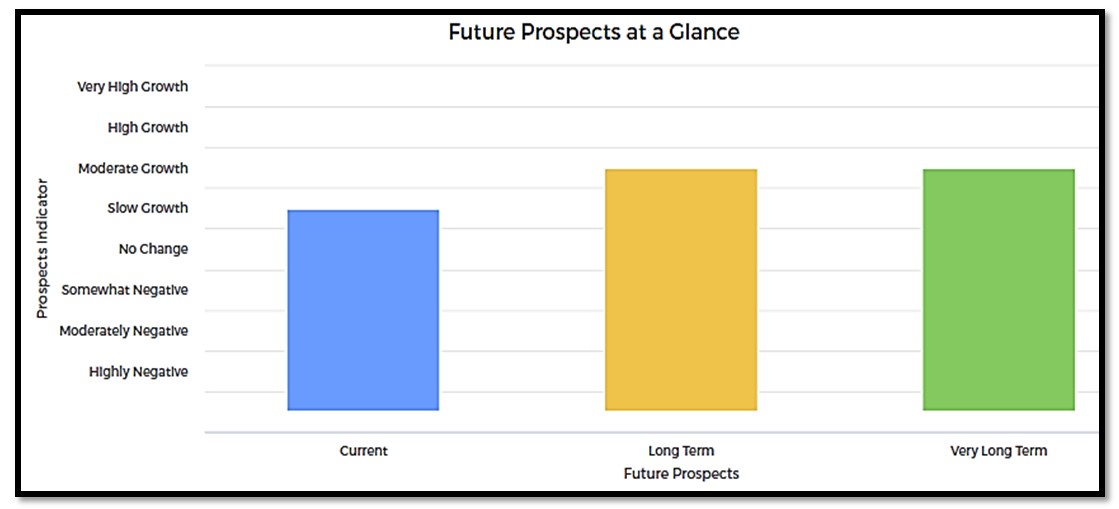
Future Prospects At A Glance
Current (0-1 year) | Long Term (2-5 years) | Very Long Term (6-10 years) |
Slow Growth | Moderate Growth | Moderate Growth |


